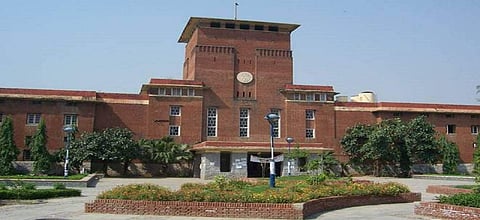

The management of two of India’s most well-known colleges-- St Stephens and Hindu Colleges have suggested that the Delhi University act be amended, two days before the University Grants Commission is set to take a final decision on St Stephen’s autonomy.
In a meeting with Union Human Resources Development minister Prakash Javadekar, the senior officials from the two colleges pointed out that clause 9(A) of the DU act says that only institutes of music, technology, and medicine can be granted autonomy and hence needs to be changed.
Members of teachers association and others protesting the move, however, were kept out of the meeting.
The management of these two colleges in the prestigious university is learned to have asked for autonomy despite widespread protests from teachers, students, and Delhi University Teachers’ association.
“In principle, we are not against the idea of autonomy but we want more clarity on it. There has to be an amendment of the act first and some other issues need to be examined,” said TS Rangachari, treasurer of Hindu College after the meeting.
Officials in the HRD ministry said that the meeting had been called to understand the “viewpoint” of the stakeholders.
As per the UGC Guidelines for autonomous Colleges, a college that comes under the scheme launched last year can determine and prescribe its own courses, restructure and redesign its syllabus.
It can also fix fees for the courses. An autonomous college is also empowered to prescribe admission rules in accordance with prevalent reservation policies, evolve methods to assess students’ performance, conduct examinations, even launch self-financing courses.
Autonomy for a college also empowers it to announce results, issue mark sheets, and migration and other certificates. However, the degree will be awarded by the university with the name of the college on the degree certificate.
A UGC committee had visited St Stephens last week which was protested vehemently by students’ and teachers’ groups.
Those opposed to the idea, however, are calling it a plan by the Narendra Modi government to initiate privatisation of the centrally funded institutes.
“The Government is moving ahead on its agenda of turning colleges and universities of repute into teaching shops through the scheme of Autonomous Colleges and Graded Autonomy,” said Rajib Ray, DUTA president.
Nandita Narain, president of St Stephens’ Teachers’ association said that the push towards self-financing courses will marginalise regular courses, leading to hike in fees, loss of jobs for ad hoc teachers as the nature of courses will change, adverse student-teacher ratio and consequential decline in quality.
“We will not be able to fulfill the objectives with which this institution was started, namely to provide quality education to a diverse students’ population, including students from marginalized sections,” she emphasised.
